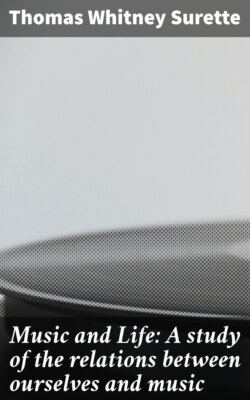Читать книгу Music and Life: A study of the relations between ourselves and music - Thomas Whitney Surette - Страница 7
На сайте Литреса книга снята с продажи.
III. THE SIGNIFICANCE OF MUSIC
ОглавлениеTable of Contents
Music deals first of all with feeling or emotion. But since emotion may be guided by the mind and transfused by the imagination,—since emotion is not a separate and isolated part of our being,—so music may be so ordered by the mind and so transfused by the imagination as to become intellectual and imaginative. It is true that the greater part of the music produced and performed deals only with emotion, but this is equally true of literature. The popular novel is nine tenths emotion, one tenth mind, and the rest imagination. So it is with music, though such illogical invention as one constantly finds in many popular novels would be intolerable in any music. Since there seems to be an incongruity between the statement that music has no definite meaning and the statement that it is intellectual, let us take a specific illustration and see if we cannot reconcile the apparent confliction.
We must first of all distinguish between the quality itself and the expression of the quality. A person may have a mind stored with wisdom and be completely what we call “intellectual,” without ever expressing himself by a spoken or written word. His wisdom exists by itself and for itself, entirely separated from its expression. If he expresses himself, and with skill, we call that expression literature, but, in any case, it remains wisdom. And what is wisdom? It is what Mr. Eliot describes a liberal education to be—“a state of mind”; it is the fusion of knowledge with experience, with feeling, and with imagination.
Now words are symbols which diminish in their efficacy as they try to compass feeling and imagination. If the wise man is cold, he can say, “I am cold”; but if he wishes to tell you of his idea of God, he has no words adequate for the purpose, because he is dealing with something which is not in the domain of knowledge alone—which he can feel, or perhaps imagine, but cannot define. The reason alone never even touches the far-away circle of that perfection which we believe to exist, and the subtle inner relations between man and the visible and invisible world refuse to be harnessed to language. For these he finds expression in some form of beauty. “The beautiful,” says Goethe, “is a manifestation of the secret laws of nature which, but for this appearance, had been forever concealed from us.”
So we say that in wisdom the qualities we call insight, feeling, and imagination must find for themselves some more plastic medium of expression than language. And when that plastic medium, though non-definitive, has those qualities of coherence, continuity, and form which are essential to all intellectual expression, we are justified in calling it “intellectual.” Let us take for our specific illustration the first movement of the Ninth Symphony of Beethoven. It is impossible to imagine this as an expression of feeling only, untouched by thought or by imagination. The inevitable conclusion arrived at by any person who understands it is that the feeling is absolutely controlled by the mind, and that it is imagination that gives it its extraordinary effect. Compare it with the first movement of Tschaikovsky’s “Pathétique Symphony” where emotion runs riot; the difference is as great as that between “Victory” and “The Deemster.” Compare it with a symphony by Mendelssohn, and the contrast is as vivid as that between a novel by Meredith and one by Miss Braddon. Beethoven’s music contains, in the first place, themes whose import all completely receptive persons feel to be profound. (That these themes do not so impress others is due either to atrophy of the musical faculty, to mental lassitude, or to lack of experience of great music.) These themes are presented in such design as not only to make the whole movement entirely coherent, but to give it a sense of rushing onward to an inevitable conclusion. So intensive is their treatment that almost the whole five hundred or more measures grow out of the original theme or thesis, some fifteen measures long. So imaginative is it that it seems to gather to itself all related things in heaven and earth and fuse them into one. In short, we must say that this music emanates from the mind of a great man, who has subjected emotion to the control of the will and who has exercised that highest function of the mind that we call imagination.
May we not say, then, that this is wisdom? Shall we deny it because it cannot be spelled out word by word? Shall we not rather say that music is a means of expressing the deepest wisdom, that which defies categorical expression? May we not accept Schopenhauer’s saying: “Music is an image of the will”? Are we not justified in stating that music is even an expression of the deepest relation with the visible and invisible world which the soul of man is capable of experiencing, and that these relations, inexpressible in more concrete manifestations, are expressible in music? The pathos and resignation and courage in the first movement of the Ninth Symphony of Beethoven are not his or yours or mine; they are the qualities themselves in their infinite being, more true, more noble, more pure than his or yours or mine. May we not, then, even go so far as to say that music tells us the deepest truths of human life; that “it comes,” as Symonds says, “speaking the highest wisdom in a language our reason does not understand because it is older and deeper and closer than reason?”
